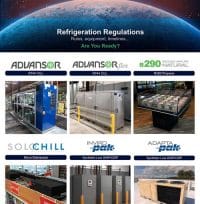
The Natural Resources of Canada organization is committed to improving the quality of life of Canadians by ensuring the country’s abundant natural resources are developed sustainably, competitively and inclusively.
Additional Resources
CARB – The Refrigerant Management Program (RMP) requires facilities with refrigeration systems containing more than 50 pounds of high-GWP refrigerant to conduct and report periodic leak inspections, promptly repair leaks; and keep service records on site. The regulation also requires service practices intended to minimize refrigerant emissions. Read More>
- CARB Service Technicians
- CARB Distributors/Wholesalers and Reclaimers
- CARB Rules for Businesses with Refrigeration Systems
- SNAP Substitutes in Refrigeration and Air Conditioning
- SNAP Regulations including Rules 19-23
- Questions and Answers About SNAP Alternatives
- EPA Ozone-Depleting Substances – This page provides information on compounds recognized as ozone-depleting substances (ODS) under the Montreal Protocol.
- EPA Stationary Refrigeration Leak Repair Requirements including Section 608 of the Clean Air Act.
- DOE Compliance Certification Database Walk-In Coolers and Freezers – Doors
- DOE Energy Conservation Standards for Walk-in Cooler and Freezer Refrigeration Systems; Final Rule
